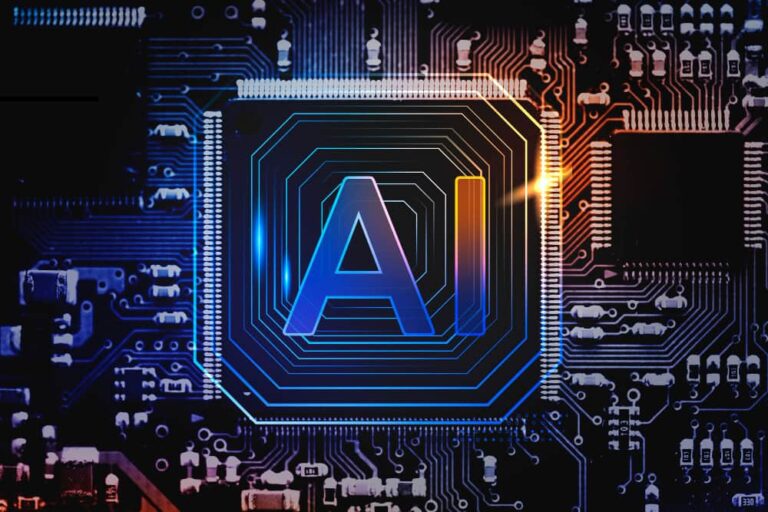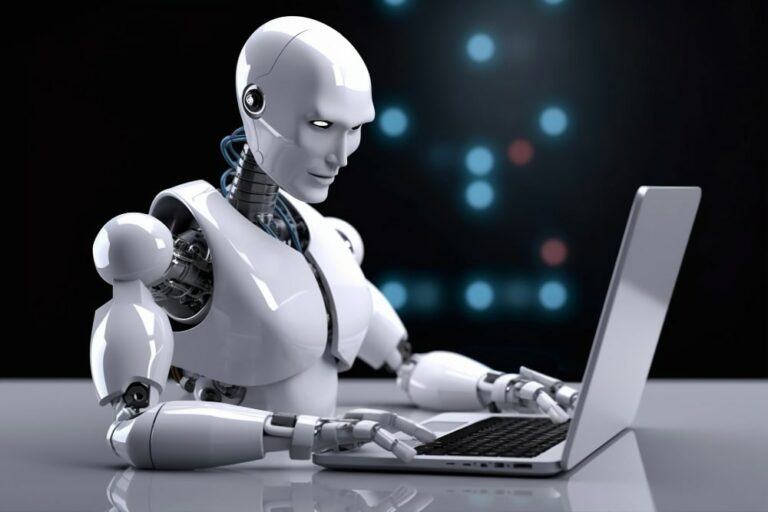In the realm of technological advancements, few innovations have ignited as much curiosity, excitement, and debate as Artificial Intelligence (AI). With its far-reaching influence touching nearly every aspect of our lives, AI has indeed sparked a transformative revolution that is reshaping industries, services, and the very way we perceive and interact with the world. In this article, we’ll delve deep into the “Impact of Artificial Intelligence: A Transformative Revolution” to unravel the multifaceted influence of AI and explore the implications it holds for the present and future.
AI is more than just a buzzword; it’s a powerful force driving innovation across sectors. To help us navigate this intricate landscape, we’ll explore five key dimensions of AI’s transformative influence:
1. AI in Healthcare: As we step into an era where precision and efficiency in healthcare are paramount, AI emerges as a life-saving ally. We’ll discuss how AI is accelerating diagnostics, drug discovery, and treatment plans, ushering in an era of personalized medicine.
2. AI in Business and Industry: From streamlining manufacturing processes to enhancing customer experiences in retail, AI is optimizing operations and decision-making. We’ll examine how AI is driving growth, cost-efficiency, and improved customer satisfaction.
3. AI in Education: The classroom is no longer confined by traditional boundaries, thanks to AI. We’ll explore how AI is revolutionizing education through personalized learning experiences and educational tools that adapt to individual student needs.
4. Ethical and Societal Implications: With great power comes great responsibility. We’ll delve into the ethical considerations surrounding AI, including bias in algorithms and the impact on jobs, as well as AI’s potential to address pressing societal challenges.
5. The Future of AI: We’ll conclude by peering into the crystal ball to speculate on the future of AI. What awaits us in this ever-evolving landscape? How can we harness AI’s potential while mitigating its risks?
Join us on this journey through the transformative revolution of AI, where we’ll unravel the profound impact it has on our lives, industries, and the world as we know it.
AI in Healthcare: A Prescription for Transformation
Artificial Intelligence has ushered in a paradigm shift in the healthcare industry, promising to revolutionize the way we diagnose, treat, and prevent illnesses. This remarkable transformation is not just on the horizon; it’s happening now. AI’s entry into healthcare is akin to a medical revolution, bringing with it a host of promising advancements.
Enhanced Diagnostics: One of the most significant contributions of AI in healthcare is its ability to enhance diagnostics. AI-driven systems can process vast amounts of medical data, including images, patient records, and clinical notes, to detect anomalies and patterns that may elude human eyes. Radiology, for example, benefits from AI-powered image analysis, aiding in the early detection of diseases like cancer and speeding up the diagnostic process.
Predictive Analytics: AI’s predictive prowess is invaluable when it comes to forecasting disease outbreaks, patient outcomes, and even individual health risks. Machine learning models can analyze data from various sources, such as wearable devices and electronic health records, to identify patients at higher risk for specific conditions and intervene proactively.
Drug Discovery and Personalized Medicine: The pharmaceutical industry is embracing AI to accelerate drug discovery. AI algorithms can analyze the biological characteristics of diseases, potentially leading to the development of more effective drugs. Additionally, AI enables personalized medicine by tailoring treatment plans to individual genetic profiles, optimizing therapeutic outcomes while minimizing side effects.
Telemedicine and Remote Monitoring: AI-driven telemedicine platforms are becoming increasingly prevalent, offering patients remote access to healthcare professionals. These platforms incorporate AI chatbots for preliminary diagnosis and provide continuous remote monitoring of vital signs, ensuring timely interventions when necessary.
Challenges and Ethical Considerations: While AI holds immense promise in healthcare, it’s not without its challenges. Ensuring data privacy and security is paramount, especially when handling sensitive patient information. Addressing issues related to algorithmic bias, transparency, and regulatory compliance is an ongoing concern that demands careful attention.
As AI continues to make significant strides in healthcare, it’s evident that this transformative technology has the potential to not only improve patient care but also reduce healthcare costs, enhance medical research, and save lives. The future of healthcare is being reshaped by AI, and the possibilities are as exciting as they are promising.
AI in Business and Industry: Pioneering Progress
Artificial Intelligence is not limited to revolutionizing healthcare; it’s making waves across various business sectors and industries, catalyzing innovation, and reshaping the way organizations operate. In the realm of business, AI has emerged as a game-changer with transformative impacts on efficiency, decision-making, and competitiveness.
Data-Driven Decision-Making: One of AI’s standout strengths is its ability to process and analyze massive volumes of data swiftly. This capability empowers businesses to make data-driven decisions with unprecedented accuracy. From sales predictions to customer preferences, AI can extract valuable insights that guide strategic planning.
Automation and Efficiency: Automation is a core pillar of AI’s influence in business. Robotic Process Automation (RPA) employs AI-driven bots to automate repetitive tasks, reducing operational costs and human errors. In manufacturing, AI-powered robots can enhance production efficiency and quality control.
Customer Experience: AI has revolutionized customer service and engagement. Chatbots and virtual assistants powered by natural language processing offer round-the-clock customer support, while recommendation engines personalize product and content suggestions, enhancing the overall customer experience.
Supply Chain Optimization: The complexities of modern supply chains benefit immensely from AI’s predictive capabilities. AI algorithms can forecast demand, optimize inventory management, and even predict potential disruptions, allowing businesses to respond proactively.
AI-Driven Marketing: Marketing and advertising have seen a significant transformation thanks to AI. Marketers leverage AI for precise audience targeting, content personalization, and ad campaign optimization. This results in better ROI and more effective customer engagement.
However, while AI holds immense promise, its implementation isn’t without challenges. Data privacy concerns, ethical considerations, and the need for AI talent are some of the hurdles organizations face. Striking a balance between automation and human intervention, ensuring AI transparency, and complying with evolving regulations are ongoing efforts.
The future of business and industry is intertwined with AI. Organizations that embrace and harness this transformative technology effectively are poised to gain a competitive edge, streamline operations, and unlock new avenues of growth and innovation. AI isn’t just a buzzword; it’s a strategic imperative for businesses seeking to thrive in the digital age.
AI in Education: Revolutionizing Learning
Artificial Intelligence’s transformative influence extends far beyond the business realm. In the field of education, AI has emerged as a catalyst for revolutionizing the learning experience, making education more personalized, accessible, and effective.
Personalized Learning: AI algorithms can analyze individual learning patterns and adapt educational content accordingly. This enables personalized learning paths, ensuring that students receive materials and challenges that suit their abilities and pace. Whether in K-12, higher education, or vocational training, AI-driven platforms can tailor education to each learner’s needs.
Enhanced Assessment: AI-powered assessment tools can provide immediate feedback to students, pinpointing areas where they excel and areas that need improvement. This real-time feedback loop allows educators to customize their teaching strategies and students to focus their efforts on specific weaknesses.
Language Processing and Translation: Language barriers are a significant challenge in global education. AI-driven language processing tools can facilitate translation, transcription, and language learning, breaking down communication barriers and making education more inclusive.
Virtual Classrooms and Tutoring: AI-driven virtual classrooms and tutoring systems have become increasingly prevalent. These platforms offer remote learning opportunities, bringing education to remote or underserved areas. They can also provide one-on-one tutoring, assisting students with their homework or clarifying concepts.
Administrative Efficiency: Educational institutions often grapple with administrative burdens. AI can streamline administrative tasks, including enrollment, scheduling, and resource allocation. This frees up educators and administrators to focus on improving the quality of education.
However, the integration of AI in education is not without challenges. Privacy concerns, data security, and ensuring equitable access to AI-driven resources are critical considerations. Additionally, there’s a need for teacher training and support to effectively incorporate AI tools into the classroom.
In conclusion, AI is reshaping education by tailoring learning experiences, automating administrative tasks, and expanding access to quality education. While challenges exist, the potential for AI to revolutionize how we learn and teach is immense, promising a future where education is more personalized, efficient, and inclusive than ever before.
Ethical and Societal Implications of AI
As artificial intelligence continues to weave its way into various aspects of our lives, including healthcare, business, and education, it brings with it a host of ethical and societal considerations. These implications are crucial to address as AI technology evolves and becomes more integrated into our daily routines.
Bias and Fairness: AI systems learn from data, and if the data used to train them is biased, the AI can perpetuate those biases. This is particularly concerning in areas like hiring, lending, and criminal justice, where biased AI algorithms can lead to discrimination. Ethical AI development requires addressing these biases and ensuring fairness.
Privacy and Data Security: AI systems often require vast amounts of data to function effectively. This raises concerns about data privacy and security. How can we ensure that personal information is protected and not misused by AI systems or malicious actors?
Job Displacement: Automation through AI and robotics has the potential to displace certain jobs. While AI can create new opportunities, the transition can be challenging for individuals whose jobs become automated. Strategies for retraining and upskilling the workforce must be considered.
Transparency and Accountability: Understanding how AI systems arrive at their decisions is essential for trust and accountability. AI algorithms can be complex and opaque, making it challenging to identify the logic behind their decisions. Developing transparent AI systems and mechanisms for accountability is crucial.
AI in Warfare: The use of AI in autonomous weapons raises significant ethical concerns. How do we ensure that AI-powered weaponry adheres to international laws and ethical standards? The development and deployment of AI in the military must be closely monitored and regulated.
Social Impact: AI can influence societal behavior and attitudes, often in subtle ways. For example, the spread of fake news and algorithmic bias on social media platforms can polarize societies and influence elections. Ethical considerations include how AI impacts public discourse and social cohesion.
Regulation and Governance: The rapid advancement of AI technology has outpaced the development of appropriate regulations. Striking a balance between fostering innovation and safeguarding against misuse is a significant challenge. Governments and international bodies are actively working on AI governance frameworks.
Addressing these ethical and societal implications requires collaboration among policymakers, technologists, ethicists, and society at large. It’s essential to strike a balance between harnessing the transformative potential of AI while mitigating its potential harm. A thoughtful, ethical approach to AI development and deployment will be essential as this technology continues to evolve.
The Future of AI: What Lies Ahead
The journey of artificial intelligence has been nothing short of astonishing, and as we stand on the cusp of the third decade of the 21st century, it’s worth contemplating the exciting possibilities and challenges that lie ahead for AI.
Advanced Machine Learning: AI will continue to advance in machine learning, particularly in areas like deep learning and reinforcement learning. These advancements will lead to more accurate predictions, enhanced natural language understanding, and better problem-solving capabilities.
AI in Autonomous Systems: Autonomous systems, such as self-driving cars and drones, will see significant improvements. This will not only reshape transportation but also have far-reaching implications for logistics, delivery services, and beyond.
AI-Enhanced Healthcare: AI will play an increasingly vital role in healthcare, from medical diagnosis to drug discovery. Personalized medicine, where treatments are tailored to an individual’s genetic makeup, will become more prevalent.
AI in Education: AI-powered educational tools will continue to evolve, providing personalized learning experiences to students. Intelligent tutoring systems will adapt to each student’s needs, making education more accessible and effective.
AI in Creativity: AI will be a creative collaborator, helping artists, writers, and musicians generate content and ideas. AI-generated art and music will become more sophisticated, challenging traditional notions of creativity.
AI Ethics and Regulations: As AI becomes more integrated into society, ethical concerns will continue to grow. Striking the right balance between innovation and ethical AI development will be a priority. Governments and organizations will work on comprehensive regulations.
AI-Enhanced Workforce: AI will augment human capabilities in the workplace. Rather than replacing jobs, AI will automate repetitive tasks and provide valuable insights, allowing employees to focus on higher-level tasks that require creativity and critical thinking.
AI in Climate Change Solutions: AI will contribute to environmental efforts by optimizing energy usage, predicting natural disasters, and assisting in climate modeling. It will play a crucial role in addressing the global challenge of climate change.
Quantum Computing and AI: The emergence of quantum computing promises to revolutionize AI by solving complex problems that are currently beyond classical computing’s reach. Quantum AI could lead to groundbreaking discoveries in fields like materials science and cryptography.
AI-Driven Personalization: AI will continue to personalize our online experiences, from shopping recommendations to content consumption. It will become increasingly adept at understanding and predicting our preferences.
Human-AI Collaboration: The future of AI is not about AI replacing humans but collaborating with them. Human-AI partnerships will be at the forefront of innovation, from healthcare diagnosis to scientific research.
While these advancements offer incredible potential, they also raise ethical, social, and economic questions that require careful consideration. As AI continues its transformative revolution, our ability to harness its power responsibly and ethically will shape the world of tomorrow.




